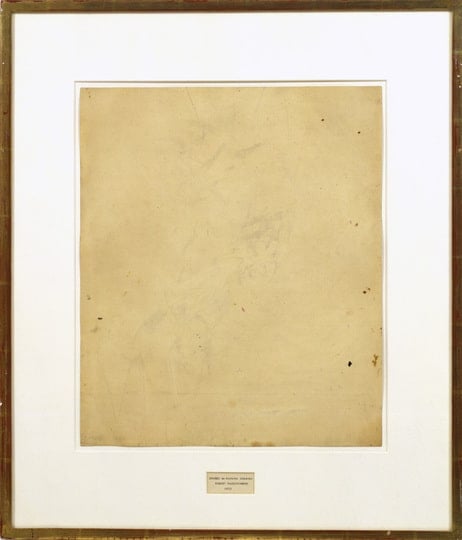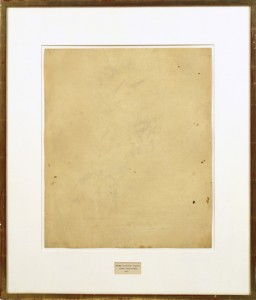There are all kinds of sayings about the sense of sight, and especially how it can mislead us: “Looks can be deceiving,” “don’t let your eyes fool you,” and “beauty is only skin deep.”
These came to mind the other day as I read this post by Richard Krulwich at NPR. It raises a fascinating question: when we see ‘nothing,’ is there really nothing there? Or are we limited lookers perhaps missing something? Krulwich considers the nothing of space and a case of blankness in abstract art. More at home in the visual arts, I’ll leave the theoretical physics to others (I’m looking at you, Matt Dunch).
Krulwich discusses Robert Rauschenberg’s attempt to capture emptiness artistically. His idea was to find a drawing and erase it, giving the impression that the paper contained nothing when it actually did. Notably un-famous when he hatched the plan, Rauschenberg asked the illustrious Willem de Kooning for a drawing. After painstakingly erasing the page, Rauschenberg’s ended up with the painting pictured to the left. It looks like nothing, but don’t let your eyes fool you — here’s a video of Rauschenberg explaining it.
The merits of abstract expressionism aside, this discussion of physical sight got me thinking about its Christian usage, where “sight” is also considered a spiritual sense. What’s true about our physical seeing can be true of the spiritual life as well: we can mistake as nothing the ways in which God is actually trying to get our attention.
Let me give an example. Back before I entered the Jesuits, I was at dinner with a visiting friend in Washington, D.C. We hadn’t talked in months, and as we caught up I bemoaned my preparations for the LSAT and reflected on how work left me feeling unsatisfied. When she asked what gave me life, I started talking about my work with the Jesuits at Holy Trinity Parish. I went on (and on, apparently) until finally my friend interrupted me. “Tim, I don’t know who you think you’re fooling. You’re supposed to be a Jesuit, not a lawyer.”
I was a little put off by this—(we don’t talk for months and you presume to…)—and thought there was nothing there. I desperately wanted nothing to be there. Despite my hopes, I kept noticing that my friend’s comment stirred me deeply—even as I replayed the chat weeks later. What she said was true.
The weeks after that conversation were an extended Examen, Ignatius’s prayer of awareness which has us look for God in the most ordinary details of our lives, including conversations with friends over dinner, our emotions, and so on. Paying attention to what seems like nothing usually revealed something I needed to see more clearly. Often enough, “nothing” is anything but.



